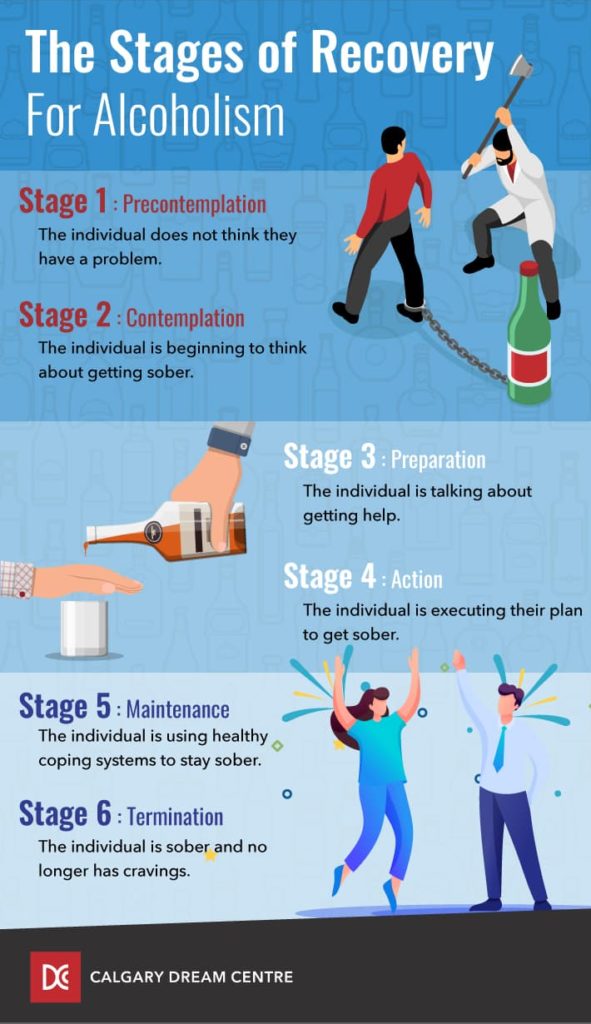Alcoholism is a disease that develops gradually, causing significant chemical changes to the brain. If you spot a loved one drinking more and more frequently, they may be experiencing the effects of alcoholism. Recovering from alcoholism is a slow and steady process and can eventually lead to a fulfilling life not ruled by alcohol.
There is no set timeline for alcohol recovery. For some, it can take months, and for others, it can be a lifelong journey. Understanding the recovery stages can help you know where you or a loved one is on the road to recovery and what is necessary to find success. These stages, called the transtheoretical model of behaviour change, were developed in the 1970s by psychologists James Prochaska and Carlo DiClemente and can give you a closer look into what’s experienced during the journey to recovery.

Stage 1: Precontemplation
The first stage on the path to recovery is precontemplation. During this stage, individuals will experience significant adverse impacts of their addiction, such as broken relationships, neglecting responsibilities, severe hangovers, and dwindling health. However, despite these side effects, they have no intention of changing their behaviour.
In the precontemplation stage, individuals will be overly defensive about their alcohol addiction. They’ll likely minimize the impacts of their alcohol use, make excuses for their behaviour, rationalize their choices, or deny having a problem at all. Some common phrases you may hear include:
“I need to drink because I’m so stressed at work. It helps me relax.”
“Lots of people drink to wind down. It’s not a big deal.”
If you approach a loved one about their alcohol addiction, they may be resentful or blame others for their alcohol use.
Some individuals will show up for addiction treatment in this stage, but it is doubtful to be effective as someone in this stage doesn’t believe they have a problem. Because they are so resistant to help, raising their awareness is the best way to help support them into taking the next step towards recovery.
It’s important to realize how someone in active alcohol addiction may feel on the inside. It’s likely they feel helpless and overwhelmed by the idea of a significant lifestyle change. Approaching a loved one with subtle and empathetic conversations is the best way to start a discussion about their alcohol use. Help them see the risks of excessive alcohol use and weigh their current behaviour’s advantages and disadvantages.
Stage 2: Contemplation
When individuals with an alcohol addiction reach the contemplation stage, they’ve probably been faced with the fact that they have a problem. However, the thought of reaching out for help or striving for sobriety may feel out of reach or overwhelming. They may be on the fence about recovery resources and will go back and forth between wanting and not wanting to make a change.
Someone in the contemplation stage may express they will seek help within an indefinite time frame, like “the next 6 months.” Procrastination or stalling will be a common occurrence during this time, alongside excuses for not seeking help with their addiction. Individuals in this stage of recovery may make some small changes to curb or cut down their drinking. This can cause them to feel stuck in this stage for a long time.
Contemplation can cause individuals to feel guilty, ashamed, desperate, and hopeless. Love and support are imperative to helping them along their journey. Help them focus on a solution to their problem rather than the problem itself, as it’s crucial for someone in active addiction to remember there is a light at the end of the tunnel.
Stage 3: Preparation
In the preparation stage, individuals have recognized their addiction and committed to change. They’re planning on taking meaningful steps to heal and aim for recovery and are preparing to take action within the next few weeks. They may still be drinking, but it’s likely they’ve begun telling close family or friends about their plan to change but could yet have some doubts.
It’s best to give individuals in the preparation stage time to process their goals. Support your loved one through this stage with detailed action plans and strategies to help them conquer alcohol addiction. This could involve helping them research treatment centres, goal setting, and faith-based approaches to source strength and willpower.
This stage will vary from individual to individual and needs to be closely evaluated to determine if quick action should be taken, or if there is time to establish a plan. The moment of clarity experienced by the individual can be short, and too long in this phase can stop someone from entering the next.
Stage 4: Action
In the action stage of recovery, individuals have chosen an approach to combat their addiction and are executing it. This typically involves detoxification or detox process, which can come with life-threatening side effects. Alcohol withdrawal is a difficult process for some, so it’s advisable for individuals going through it to do so in a medically-managed environment.
After detox is complete, individuals in the action stage can begin to work on the behavioural, social, and psychological issues that go hand-in-hand with alcohol addiction. Many different programs exist to make this process easier, many of which involve treatment programs, individualized counselling, group therapy, and other helpful steps.
The action stage is incredibly stressful for individuals, both mentally and physically. Because of this, the risk of relapse is high. Encouraging loved ones in this stage to call their sponsor, pray, or reach out to close friends or family when feeling low is helpful in this part of the recovery process.
Stage 5: Maintenance
Once someone has completed a treatment program, they move into the maintenance stage. During this stage, recovering alcoholics begin to feel the benefits of quitting alcohol while striving to sustain the achievements they’ve made throughout their recovery.
In the maintenance stage, the behaviours they’ve learned during their journey become second nature. They’ve developed new skills, healthy coping strategies, learned what triggers to avoid, and found alcohol-free ways to have fun.
Stage 6: Termination
The final stage of alcohol recovery is the termination stage. However, this stage is controversial as many recovering individuals may not always reach it in every journey. A more accurate picture would be that at this stage, the individual isn’t thinking of returning to addiction habits, but they are moving forward with a recovery lifestyle.
Addiction is a chronic relapsing disorder that can accompany individuals for the better part of their lives. For some, the risk of relapse always remains, and they require lifelong treatment.
However, termination is a stage that individuals in their journey to recovery are aiming for. This stage is where they can live a sober life free from cravings and temptation. The best way to help a loved one is to offer constant judgement-free support during their journey, and hopefully, they can eventually reach this point.
The Cycle of Recovery
It’s common for alcoholics to relapse during their journey to sobriety. Many individuals will move back and forth through the stages as they battle addiction and work towards a fulfilling, sober life. 40 to 60 percent of people recovering from addiction will relapse at some point, but this does not mean their recovery has failed.
If you’re trying to help a loved one through their recovery process, be sure to offer love and support as they combat addiction. Most recovering addicts will cycle through the different recovery stages a few times before making it to a stage where they are comfortable with sobriety.
Directing a loved one to the Calgary Dream Centre can be helpful, as there are many different useful programs to assist them in their recovery process. Above all, be sure to show compassion and support continually. Addiction is a fierce obstacle to overcome, but with encouragement and love, it can be done.



